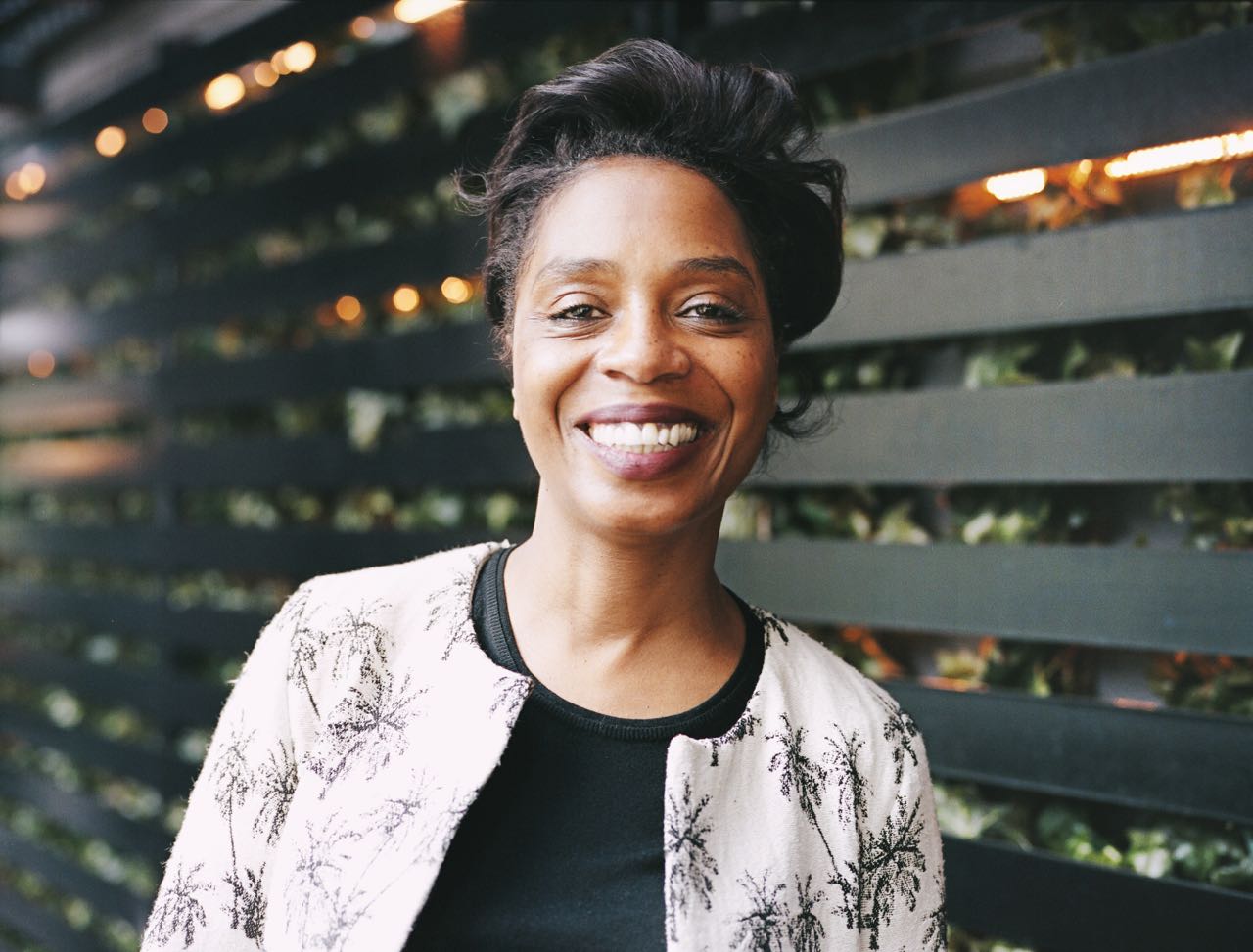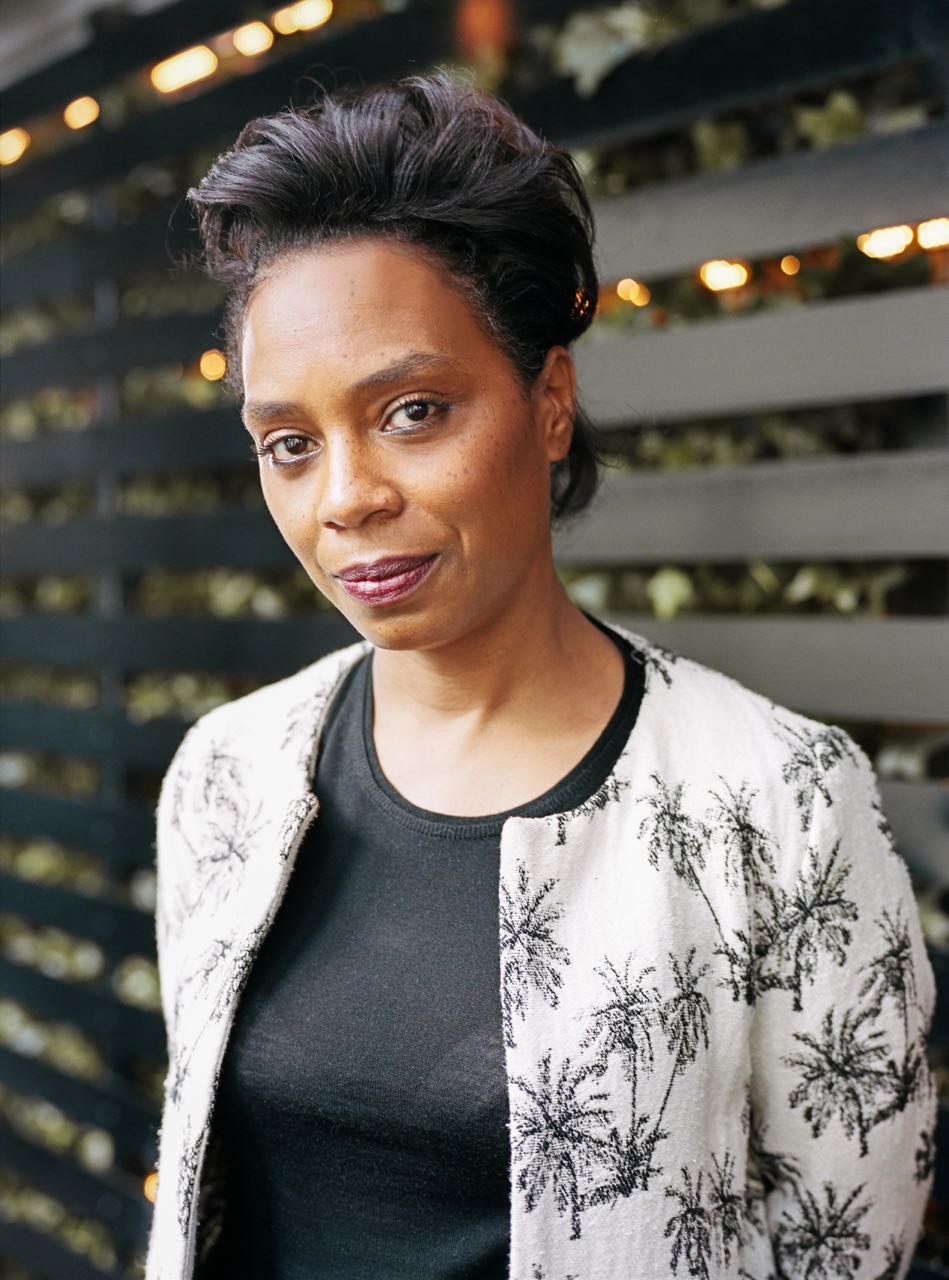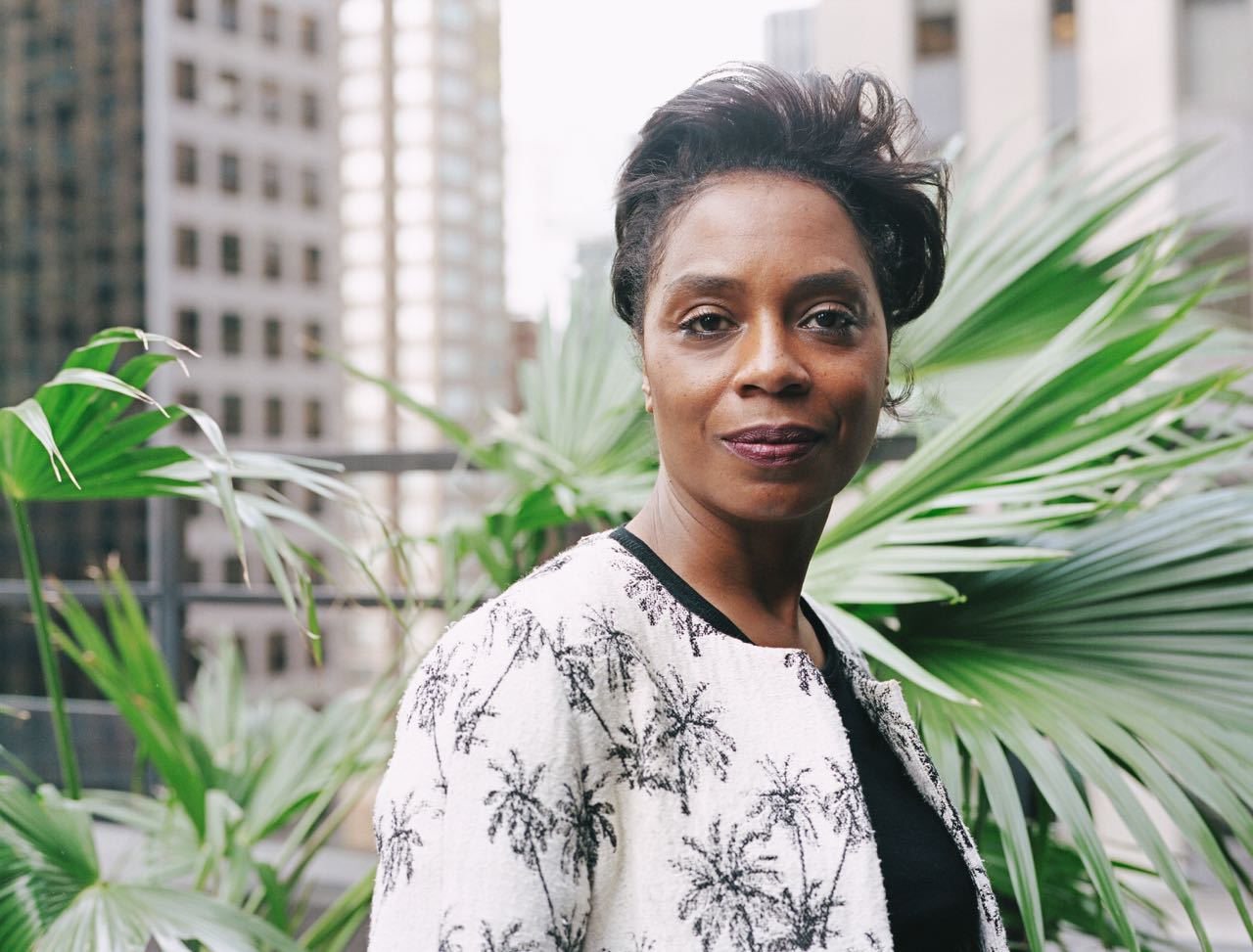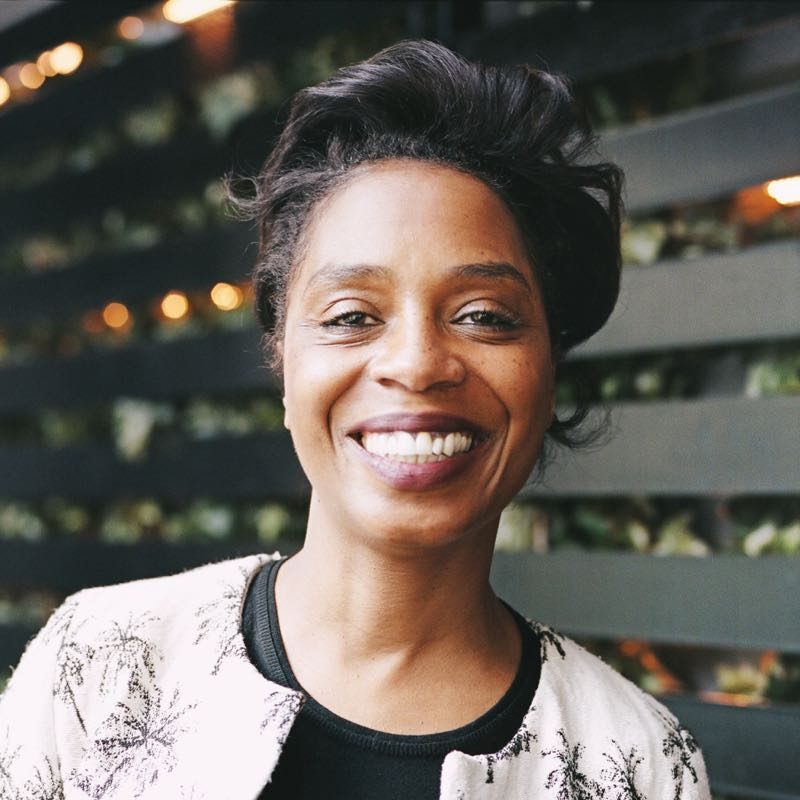An Interview with Michelle Wilson

Written by Victoria Myers
Photography by Jacqueline Harriet
May 18th, 2017
In Lynn Nottage’s Tony-nominated and Pulitzer Prize-winning play Sweat, Michelle Wilson gives a critically acclaimed performance as Cynthia, one of the trio of female friends who works at a factory in Reading, Pennsylvania, and who eventually gets a job in management. Among the numerous issues Sweat explores is the complicated nature of female friendship, especially when ambition, race, and class get thrown into the mix. Cynthia is at the center of that dynamic, providing a multifaceted character for an actress to play. A few weeks ago, Michelle earned a Tony Award nomination for Best Supporting Actress in a Play for her work in Sweat. Other credits include Detroit ’67 by Dominique Morisseau (a playwright with whom she frequently works), A Raisin in the Sun, and For Colored Girls at Steppenwolf. We recently sat down with her to discuss her process for Sweat, audience conversations, development of new work, and more.
How are you finding the challenge of balancing all of the press and all of the obligations that come with being nominated for awards?
I don’t know if there’s really any balance; you just keep swimming. But it’s awesome, and you should have such problems. It was a shocker, so I wasn’t prepared for it. It’s been completely overwhelming and delightful at the same time.
When I’ve talked to other actresses, they’ve talked about how there’s a learning curve with all of that because it’s not something that they teach you: how to deal with the responsibilities that come with being in a show besides just what happens on stage.
I had just came off of doing Detroit ’67, Dominique Morisseau’s trilogy of Detroit plays, and we took it home to [a theatre in] Detroit. It was the 50th anniversary of the riots in Detroit. We took it to Baltimore on the eve of the one-year anniversary of Freddie Gray. So I’d been dealing with a lot of responsibility and talking to people, and talking about art and its role civically and socially.
With Sweat, have you gotten a lot of that? Of people wanting to engage with the larger context of the show?
Oh, yeah. Sweat is the kind of show where we could have a talkback every night because people are jangled and they have a lot of questions like, “How did this happen?” It’s only one dynamic of what happened, but it gets at a sliver of how deindustrialization has affected so many people, and they’ve been in pain, and they’ve reacted out of that pain.
I want to go way back to The Public and when you first started rehearsal. Do you like to come into rehearsal with a lot prepared, or do you like to come in and see what happens?
I probably more like to come in and see what happens. I’ll read the material a number of times, but I don’t start loading in lines. These people in particular, being from the Midwest, the Rust Belt, they felt very familiar to me. So it was more of wondering who this ensemble of actors was going to be. That has been one of the delights and saving graces of this process: this ensemble. It’s such a generous, playful, human group of people.
Did you do any research?
They had a lot of research for us about Reading. I did just the bare minimum. Like I said, I’m from a community that was a company town and that was stripped of dignity, so that was familiar even if I didn’t know the specifics of Reading.
I know Lynn went and spent a lot of time in Reading. One of the things I talked to her about was how you turn that into a creative endeavor and not journalism or documentary theatre. So I was wondering, as one of the actors in the piece, how do you come into that?
Lynn’s work is so dense. There’s not a lot that you have to do outside of the script. What you have to do is, you just keep climbing into the density of her scripts and you just don’t come up for air. Kate Whoriskey warned us. She said, “You’re going to use not only every minute of rehearsals, but every minute of previews.” You’re like, “Ah, I’ve done this before… Oh shit, she’s right.” To this day, we’re still finding new stuff because it’s just so dense and it’s so rich. It’s a never-ending exploration.
What’s your first way into a character?
I have to write. Literally, that’s how I memorize. I have to write journal entries and memories. While I’m building, I usually go through a number of notebooks.
Do you mean you write a background for the character, or something else?
Just snippets. I do have to write, literally, the language as I’m trying to memorize it, but the language and the words and the stories will take me down a path. So it’ll be a [memory] of when Cynthia was 16 and was hanging out with her father, or the first time she saw Brucie [her husband]. But it’s not a full story, it’s just snippets. The words feel like music to me. As I’m taking them in, it feels like I’m playing music.
Do you use the musicality of the language in shaping the arc of your character or to guide that a little bit?
It can be tricky, because you don’t want it to come off as poetry. Lynn’s work is extremely poetic and dense and it’s full of metaphors, but with these people in particular, it has to sound very matter-of-fact. I think that my instinct is to be more melodic, and Kate Whoriskey did an amazing job of helping us shape it and pulling it back so that it was matter-of-fact.

This play also has characters that the audience might have preconceived notions about. What is that like for you as an actor?
Well, it’s interesting, because I come from a working-class community. What I find so interesting in the arts is that working-class people are usually pathologized. [Plays] lead with their pathologies—they’re drunks, and they’re this and they’re that, and they beat their wives. What Lynn does is she leads with their humanity. She is so deceptive, because you fall so in love with these people as human beings and you care about them so much that when they start to be stripped by circumstances, your empathy and your heart just breaks. She just humanizes these people so much. She doesn’t let the audience off the hook. We’re complicit. If, as an audience member, you were unaware that huge swaths of the country are suffering like this… Those are our neighbors. These are people. I think there’s a dynamic where people want to say, “Well they must deserve it, right? Somehow, they must not be as smart or as hardworking as I am, because I’m fine.” I think that it’s because it makes us feel very vulnerable to realize but for the grace, we’re all just a step away from circumstance.
Have you found with the show that the audience reaction has affected your performance?
No. I feel like the show is so solidly built. You’re being affected because we’re being so thoroughly affected. That doesn’t change. Each one of the performers in this ensemble goes out and literally spills their gut every night. Your reaction [as an audience member] is just mirroring what we’re going through. Lynn and Kate are so rigorous about time—keep it going, keep it moving. I realized that one reason why they’re so particular about the pacing is because they want the experience to be as relentless on the audience as it has been on the people. So it’s like you’re getting punched in the face. Just when you try to recover from one thing, something else hits.
One of the things that I thought was interesting about the show was that it deals with female friendship, which we don’t see that much of to begin with. But particularly, we don’t see the kind of dynamic that’s portrayed in the show where you’re dealing with ambition, race, and class all at once. What was it like for you exploring that?
I am a single mother. My daughter’s coming home today after her first year at Smith, studying neuroscience. There have been times where I’ve had to stop acting in order to provide, and women have always saved me, particularly in the workplace. The way that women can surround each other and protect each other and share strategies, that’s very familiar to me, and the conflict that these women have is very familiar. That racial dynamic, the class, people stepping out of what’s considered the norm with their ambition and how that has repercussions. I’m just very grateful that Lynn is exploring women of a certain age. The cast is so diverse. We have these interracial friendships and relationships. It’s just more than you can ask for.
How ambition pertains to all those things is really rare to see on stage.
Unapologetically. [Cynthia is] unapologetically ambitious. She wants the “more,” but we’re all supposed to want the “more.” But what that does to the dynamics of her relationships… And her son is ambitious [too]. You can see what it’s starting to do to his friendship.
In rehearsal, did you talk about the delivery system for any of that? We hear so much about women and likeability, but what happens when you put characters on stage who are going after things and who are from a socio-economic bracket that isn’t seen on stage much?
It’s interesting. This is a much more Chicago play. It’s like a grimy Steppenwolf play. Chicago’s my creative home, so it was very familiar to me. I am not drawn to characters that are supposed to be likeable and who are supposed to behave. Particularly in women. I resent that so much, how much of ourselves we have to give away to seek approval. It was so refreshing to see these strong women. I feel like it’s in their physicality. The way they sit. They don’t cross their legs. That just came out of the rehearsal process. We started mirroring each other, and just the physicality of what the clothes would do, and knowing that we had been on our feet for ten hours a day. I think it’s really profound what Lynn has done, the fact that she’s refocused the narrative. There is no white male gaze here. Instead, it’s the gaze of a community of a certain class, primarily seen through the eyes of these two young men who are on the cusp of manhood, and two middle-aged women.
I’ve had two shows where I’ve had female playwrights and directors. Chelle in Detroit ’67 by Dominique Morisseau is not very likeable at all, but you love her. I come from a matriarchy, and I don’t remember my grandmother needing to be liked, but you’d listen to every word she said. She was wise and smart. She was a very loving woman, but I don’t remember her needing to be liked. It might have something to do with not only class, but race. We’re not classic butter-blonde ingénues either. The act of putting middle-aged women on the stage, the act of putting a black woman on the stage not in a musical and not in a revival, it’s an act of politic. You’re saying something.
Have you found audience responses have changed since the election? You had been running for a week or two at the Public when the election happened.
Yes, then we had Election Day off, then we came back and we had a talkback that night. The audience just sat there stunned. The response prior had been like, “Oh, these people. I really care about them and it’s really sad.” The day after the election, the reaction was, “This is what happened. We didn’t hear. We didn’t know, or we didn’t pay enough attention to people’s pain.” But I do want to be careful because as many deindustrialized, stripped people voted for Trump, there were an awful lot of middle class white folks who voted for him as well. So I want to be careful that we don’t pathologize [the working class] and put Trump on their shoulders when it’s on all of our consciences. Even if you didn’t vote for Trump, but you didn’t realize how much people were hurting, you’re part of the problem.
From your point of view, what’s something you think could be done to help develop new plays?
There are places that do it really well. Premiere Stages at Kean University. I’ve done two productions out there and I’ll do anything for them, because they have a festival, and then they give the festival winner a full production. So they take people out of development hell. Dominique Morisseau’s Follow Me to Nellie was out there and The People Before the Park [by Keith Josef Adkins]. They were both period pieces. They gave them full resources. I’d like to see people get out of development hell and get into spaces where we can get material up on its feet so writers and actors can start working together to see what something is. A lot of times plays get to a certain point, and what they need is a production. They need to get up on their feet. I just wish that we weren’t so product-oriented so there was a safe space to get things up on their feet and work out the kinks where people aren’t going to be tagged and reviewed.
From an actor’s standpoint, is the current development process difficult because you go do a reading and you don’t know what’s going to happen? I know they have had some conversations recently about making sure artists are properly compensated for their contributions in the development process.
You go do a reading and they’ll ask for five days for 150 dollars. When you’re trying to raise a kid, that’s irresponsible. I can’t do that. But I want to be supportive. I love new works and I love being in the process, but for the love of God, nobody working in New York can do that. There’s something that makes me sad because actors are willing to sacrifice anything for a good story, so it feels like it’s taking advantage. Fair wage on stage. For real, it means something.
What do you think could make it easier to be a working parent in theatre?
It’s just not easy to be a parent, then to add single parent on top of it, and artist. You just have to do what you love and be brave. Stick with it. I have an amazing creative community. When I brought my daughter back to New York, she was eight, and we were just surrounded by friends—filmmakers, playwrights. So even when I had to provide and couldn’t do a play that was downtown for 200 dollars a week, friends always had new works that I was reading in their living rooms, and independent films that I was doing. So I urge people to find your tribe and do anything. I mean, particularly with my friends who were filmmakers, if I wasn’t in front of the camera, I would do craft services. “What do you need me to do? How can we get this art made?” I feel like, “How can I help you and empower you to make your art,” is going to have really powerful reverberations for a long career. Not just being an actor, but being part of a community. I feel like becoming a mother made me a much better actor. I had no time for the neurosis or the bullshit. Focusing on work, I focused, other times I had to mother. I just feel like it made me such a better artist.

What was your process like for navigating all of the industry stuff like typecasting? And how did you develop as a creative person while you were in an industry that’s so intent on telling you what you do, what you don’t do, what you’re good at, and what you aren’t good at?
Once again, I was surrounded by brilliant friends, and some people who were writing for me. That really helps. But also, I’ll say about my agency: I’ve said no to them more times than I’ve said yes, and they were just so loyal. I couldn’t go audition for things that were going to be in Baltimore or that are somewhere outside of New York. I have a child in school. They would always bring something to me and let me decide. So I don’t get sent out on a lot of bullshit. I say roles find me, I don’t find them. Something that’s important that resonates, we’ll find each other.
Has that always been your philosophy or is that something that you’ve learned?
I’ve learned it. I remember when I was in Chicago, I was young and I looked like a baby, and a Russian director friend said, “You’re going to have to learn to be still.” He said, “Because you open your mouth and you sound like an old, wise woman, but you look like a teenager.” I just wasn’t the classic ingénue. It didn’t match. I remember probably about ten years ago I saw him. I was on the porch of the O’Neill and he came around the corner, and he goes, “Well, there you go. It’s your turn. It’s your time.” The craft is so personal. Your journey is so personal. Just get on the road and see where it takes you.
Words like ingénue are pretty weird and antiquated anyway.
Totally and completely. I remember reading The Bluest Eye as a freshman in high school thinking, “Oh my God, I can’t wait until they start doing this kind of writing in theatre and film.” I had this feeling like, “It’s coming, it’s coming,” and it’s here. You have Lydia Diamond and Dominique Morisseau and Katori Hall and Ava DuVernay who are inheritors of that rich, literary legacy of what it means to be a woman of color in the Americas.
What other areas of culture influence your work?
Literature and music, for sure. It’s really interesting because I was never one of those people that was attracted to A Raisin in the Sun. I read it and I never saw myself as a Beneatha, but then I worked on it as a Ruth on Broadway as an understudy. I realized that what attracts me is that the women in that play are natural blues women. A blues song is not all about crying. It’s finding the rhythms and the joy and the highs and the lows all within a song. Connecting plays to music and how we use music to survive.
Since you’re in a play now by a female writer and director, what’s something you think the theatre community can do to improve gender equality for women?
You know what’s fascinating about this piece at this time? I think it can only have come from a woman. Probably a woman of color. Interpreting the “is” of it. Not how we want it to be, not our fantasy of it, but the “is” of the right now. I really feel like it would take someone, a woman of color, who is already marginalized. I’ve heard Lynn say that one reason why she’s so good at the interviews is because, as a woman of color, she disappears in people’s psyche. I’m so proud of her, but I feel like it couldn’t have been done by anyone else. The kind of sensitivity it would take. The moving yourself out of the way, the non-judgment, and the way that Kate Whoriskey led us through all the landmines. This is not your usual Broadway fare. We know that Broadway is still a white male boys’ club. I’m just so happy at our reception.
Is there anything that you feel should be part of the conversation about Sweat that you feel like hasn’t been so far?
No. That’s what’s been so delightful about this; I feel like we’ve been able to get it said. We’re in the zeitgeist of something. People are waking up, and I feel like we’re waking up out of a collective fantasy of what we wanted things to be. I feel like we’re actually having some mature conversations. It’s refreshing. I still think our politic in the public domain is pretty brutal, and us versus them, and “they don’t get it,” but I feel like art is really trying to bridge that gap.

